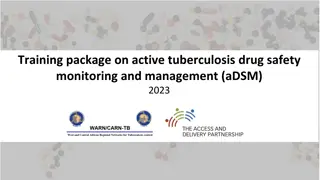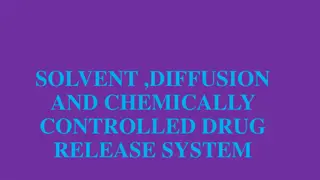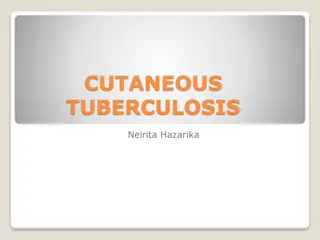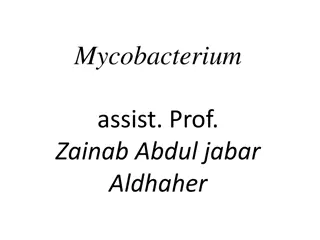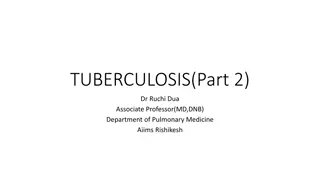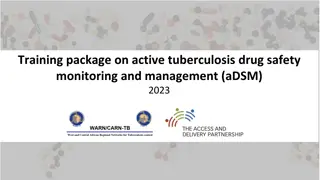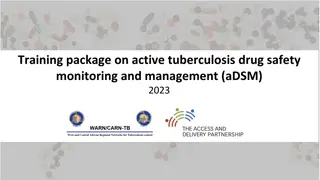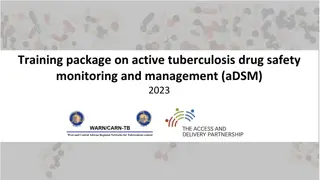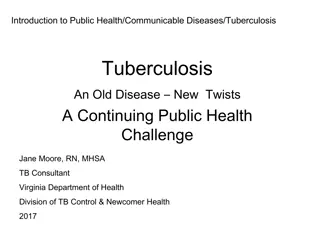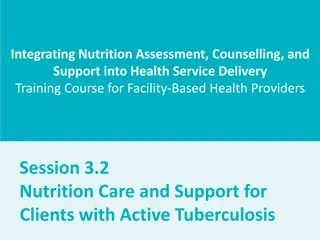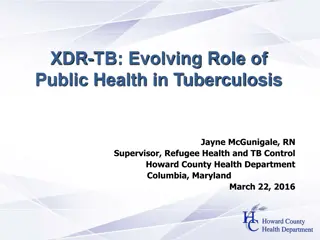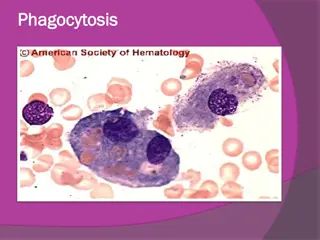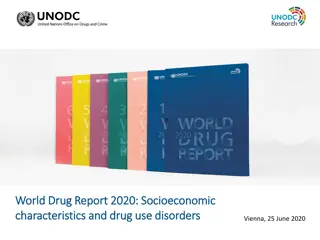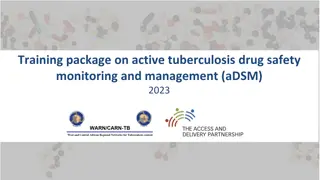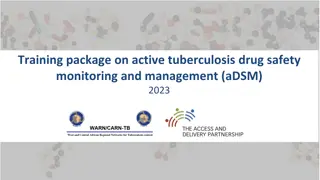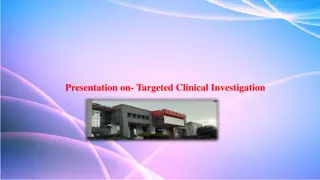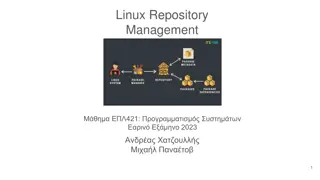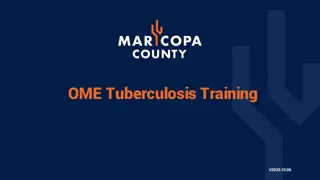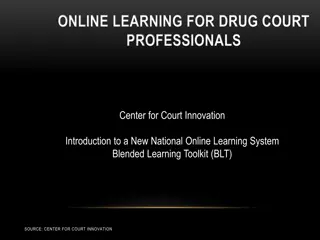Active Tuberculosis Drug Safety Monitoring & Management Training Package 2023
This training package focuses on the implementation of active tuberculosis drug safety monitoring and management (aDSM) in 2023. It covers the role of national and international partners, learning objectives, key steps in aDSM implementation, creating a national coordinating mechanism, developing a plan for aDSM, and defining management and supervision roles. The content emphasizes the importance of partner support, technical expertise, and effective strategies for successful aDSM implementation.
Download Presentation

Please find below an Image/Link to download the presentation.
The content on the website is provided AS IS for your information and personal use only. It may not be sold, licensed, or shared on other websites without obtaining consent from the author. Download presentation by click this link. If you encounter any issues during the download, it is possible that the publisher has removed the file from their server.
E N D
Presentation Transcript
Training package on active tuberculosis drug safety monitoring and management (aDSM) 2023
3.5. Role of national and international technical and funding partners in the implementation of aDSM
Learning objectives By the end of this presentation, the participant is expected to be able to: 1. Identify key areas in the implementation of aDSM in which partner support would be of help 2. Match the strengths of particular partners (technical, advocacy and funding) with specific gaps
Key steps in aDSM implementation Create a national coordinating mechanism for aDSM PARTNER SUPPORT Develop a plan for aDSM Define management and supervision roles and responsibilities Create standard data collection materials Train staff on the collection of data Define schedules and routes for data collection and reporting Consolidate aDSM data electronically Develop capacity for signal detection and causality assessment
Create a national coordinating mechanism for aDSM Provide technical advice (could be members on the coordinating mechanism, depending on setting) Facilitate discussions and advocate for appropriate visibility of the national coordinating mechanism in the public sector hierarchy Invite aDSM experts from other countries to share experiences
Develop a plan for aDSM Facilitate discussions Share technical expertise in terms of project management (e.g. development of the plan and budget, strategy, indicators, etc.) Share templates or examples from other settings Support the writing of the plan (technical, funding)
Define management and supervision roles and responsibilities Share templates or examples from other settings Act in some of the roles and take on some responsibilities (e.g. if a partner is supporting a treatment intervention in an administrative area then they can support aDSM in that setting)
Create standard data collection materials Share technical expertise (e.g. expert review of the paper or electronic forms used in the country) Share templates, examples from other countries Help draft standard operation procedures, adapt data collection tools Ensure that any tools developed by a partner in a country are in conformity with the requirements for local and international reporting
Train staff on the collection of data Facilitate the organisation of training at different levels (e.g. national, regional, district, health facility, private sector) Share technical expertise (e.g. pedagogical advisor support) Share curriculum, case studies and other materials Train the national trainers Provide funding & venues for training activities Develop training materials
Define schedules and routes for data collection and reporting Facilitate discussions Share examples and lessons learnt from other settings Support the collection of data and reporting to national and global level Updating the methods as knowledge advances
Consolidate aDSM data electronically Technical support in adaptation of existing system (or implementation of new system) Help on revising systems to allow reporting
Develop capacity for signal detection and causality assessment Role for partners? Facilitate discussions Organize dedicated training on signal detection (methods, stats) and causality assessment
Conclusions Technical partners could play an important catalytic role to help national TB programmes implement the changes required to introduce aDSM In addition to the technical expertise, advocacy and facilitation of discussion, given the relative novelty of aDSM agencies and donors may need to provide funds to enable key activities in the short term (e.g. to train, hire consultants, undertake some of the clinical tests, modify information systems) In the maintenance phase and long term, partners could play a role to ensure supervision, completeness of reporting and updating the methods and human resource development
Acknowledgements The development of the aDSM training material was funded by TDR as part of the Access and Delivery Partnership (ADP) with funding from the Government of Japan. These training materials were put together in 2016 the WHO Task Force on aDSM with technical partners KNCV Tuberculosis Foundation, Management Sciences for Health (SIAPS), MSF, WHO GTB, and TDR. The materials were updated in 2022-23 by Mahamadou Bassirou Souleymane (TDR consultant) with Marie-Eve Raguenaud (TDR), Branwen J Hennig (TDR), and Corinne Merle (TDR), and reviewed by Linh Nhat Nguyen (WHO/GTB), Medea Gegia (WHO/GTB), and Fuad Mirzayev (WHO/GTB). We thank all members of the WARN/CARN-TB working group on aDSM who contributed to the development of the aDSM generic guidelines as well as the secretariat, particularly Dr Christ Houessinon: Disadidi Ambrioso, Esse Marius, Adomou Jamal Rouamba Ruffine, Haro Sougrimani, Koumbem Boureima, Nsanzerugeze Jos lyne, Tollo Tollo Daniel Alphonse D sir , Mpaba Minkat Th ophile Mistral, Julie Abessolo, Ursule IDOKO, Tijan Baldeh , Wandifa Samateh, Tida S Kinteh, Alieu Wurie, Mardemn Yeasuen, Benjamin K. Quenneh, Cheick Oumar Bah, Kane El Hadj Malick, Aw Idriss, Mamoudou Hama Rachida, Gagara I. M. Assiatou, Katamb Balkissa, Seiyabatou ElhSaidou, Liombo Anastasie, Lunganyu Junior, Kitambala Sentime, Lula Yves , Habimana-Mucyo Yves, Migambi Patrick, dos Santos Brigite, Castro V nia, Wadson Cruz, Gueye Aminata, Mukeh Fahnbulleh, Bailor Samuel, Manjo Lamin, Saleh Mahareb Abdoulaye, Haroun Saleh Naima, Mouhoudine Yerima, Kpelafia Silifa



